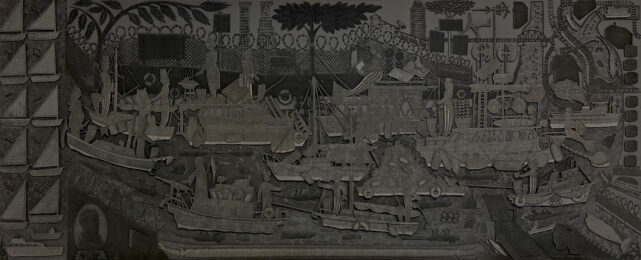

Duke Riley was born in Boston Massachusetts in 1972. He received his BFA from Rhode Island School of Design and his MFA from Pratt Institute. Riley is fascinated by maritime history and events around the waterways of New York City. Riley’s signature style interweaves historical and contemporary events with elements of fiction and myth to create allegorical histories. His re-imagined narratives comment on a range of issues from the cultural impact of over development and gentrification of waterfront communities to contradictions within political ideologies as well as commerce and the role of the artist in society and at war.
Riley’s work addresses the prospect of residual but forgotten unclaimed frontiers on the edge and inside overdeveloped urban areas, and their unsuspected autonomy. He is interested in the struggle of marginal peoples to sustain independent spaces within all-encompassing societies, the tension between individual and collective behavior, the conflict with institutional power. Riley pursues an alternative view of hidden borderlands and their inhabitants through drawing, printmaking, mosaic, sculpture, performative interventions, and video structured as complex multimedia installations.
Duke Riley often works in the tradition of field naturalists, seeking and gathering data, artifacts, and specimens outdoors, transporting them inside for closer observation and study, displaying them in museum-like diorama settings. He combines populist myths and reinvented historical obscurities with contemporary social dilemmas, connecting past and present, drawing attention to unsolved issues. Riley profiles the space where water meets the land, traditionally marking the periphery of urban society, what lies beyond rigid moral constructs, a sense of danger and possibility throughout his projects.
Riley has had solo exhibitions at Magnan Metz Gallery, New York City; the Museum of Contemporary Art Cleveland; the Queens Museum of Art, Queens, NY; and the Havana Biennial, among other venues. He has received numerous awards and commissions, including a Percent for Art commission, a Joan Mitchell Foundation Painters & Sculptors Grant, and the MTA Arts For Transit commission for the Beach 98th Street Station renovation.